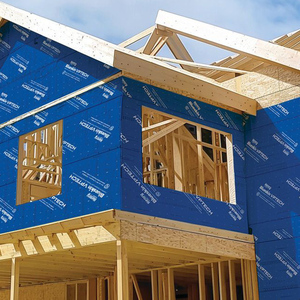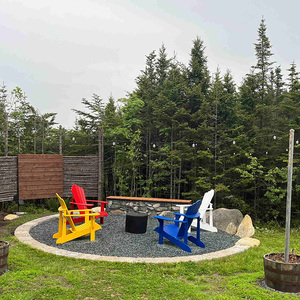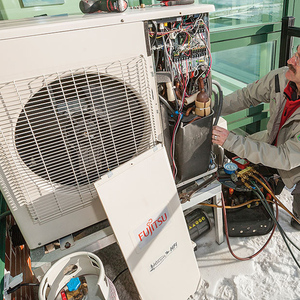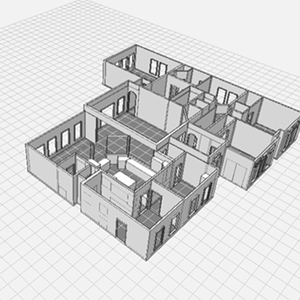*
I have a finished basement with HWBB heat. As the loop makes its way around the basement, the 3/4 copper goes thru the concrete slab and comes back out again to connect the heating elements. There are also hot and cold copper water lines that are run thru the slab.
Should I be concerned with this installation? Should I get the copper out of the floor?
Thanks for your time.
Chris in N.J.



















Replies
*
There is nothing wrong with running copper lines through a slab. They should have been wrapped in plastic, paper or something to allow pipe movement free of the the concrete and versa vise. There is a material called poly-sleve made for this, but anything will do. If they just pass through the slab, there should be no problem even if they are not wrapped. If they are embedded in the slab for any distance there could be a problem, since the coefficient of thermal expansion (ie the amount a material expands and contracts with heat) is incompattable between concrete an copper. There should be no fittings under the slab that are not silver brazed, but there is no way to determine this after the fact. If I were you I would rely on the old adage, "if it ain't broke don't fix it."
*
Chris, I would be more concerned about whether you have any insulation around the heating pipes that run underground. The normal practice that I'm familiar with, is to install the piping in a heavy duty foam insulation before it is buried and then continue the foam out through the floor. Then the concrete is poured and the foam also keeps the concrete from contacting the copper pipe.
I can't say that I've ever had to replace a copper tube that was corroded by concrete, but as Mike pointed out, in new construction it is very easy to isolate the tube from the concrete anyway.
*
The instructor at a plumbing class I took said that UNPROTECTED copper coming out of a slab will actually leave little pieces of copper powder or shavings where it rubs against the slab. Due to the different expansion rates of copper and concrete (the expansion coefficients of concrete and steel are almost identical). This expansion and contraction against a rough surface can eventually wear thru the pipe wall.
*Every plumber in Hawaii has an audio leak finding device, as almost all of the ground level houses there are slab built, and there's something about the soil and/or concrete that leads to pipe leaks, usually in the hot water line.
*
Our house was built in 1972, brick veneer on a concrete slab in Canberra, ACT, Australia (brief hot summers and, by North American standards, brief mild winters). All water services, hot and cold, pass through insulated 1/2" copper tubing (yes, we have gone metric here but these were laid before metrication was completed) in the slab. In addition we have 3/4" black polythene piping in the slab to convey gas heated water for in-slab heating. We abandoned this form of heating when we installed a gas wall heating unit and a slow combustion wood fire which, by passing the products of combustion through a convoluted flue, heats a brick mass in the centre of the house, and suffices for most of our winter. Also, there was water loss from the in-slab poly-pipes and I could never locate the leak. This problem waits in my in-tray. With advancing age and a progressing lower back problem, wood heating is becoming less and less attractive and one day soon I must address the leaking poly-pipes. But, I digress. About 7 years ago we found water under the kitchen sink cupboard coming through the lagging around the hot water pipe. I traced the route of the hot water pipe through the slab by running the taps and walking around the cork-tiled floor in bare feet. I lifted tiles and excavated the hot water pipe at intervals until I located a leak. Then I called a plumber. The pipe was corroded and pitted, both outside and in, a faulty batch, in the opinion of the plumber. The insurance company would not permit the plumber to excavate and replace the full length of the pipe at their expense and it was beyond our capacity to pay. So a 2'6" length was replaced. However, the insurance company was prepared to meet the cost of replacing the cork tiles over the entire floor. Let us be thankful for small mercies. God knows how much more pitting remains and when it will leak again: the sword of Damocles hangs over our heads. When we recently got a new kitchen we had a removable bottom shelf put in the sink cabinet to allow easy inspection. The next time it leaks I will bypass it and put pipes through the walls and ceiling, cheaper than digging up the slab and replacing the tiles again; next time insurance may not be so benevolent. If I were building with a slab floor again I would avoid at all costs putting any pipes at all in the slab. Yes, I know, our situation is among the, say, less than 1% that has problems of this sort but look at it from the point of view of the owners of one of the <1% of affected houses. A bit of extra inconvenience and cost at the outset could pay huge dividends. There is no shortage of examples of precautions a good builder takes by way of insurance against costly mishap 10, 20, 30 years down the track; this should be one of them. To all of you with copper tubing in your slabs, from Down Under, sleep well!
*
I'm no plumber, but I am betting that in the U.S. (if not elseware) there must be hundreds of miles of copper pipe running thru concrete slabs in commercial buildings. And they are still building them that way, most likely with some kind of wrap as suggested by Mike and G.
So I have to think that this is not a problem.
Rich Beckman
*
Great care...should be taken...when running copper through a concrete or a slab...all pipes should be wrapped...inspected...and given a thorough once over...before pouring.
Any contact between copper...and concrete...is not good. Expansion and contraction of the concrete can be expected.
I had a project...which the client lost 300,000 gallons of water...from a copper pipe that was run through a concrete wall of a planter..
The pipe was 5' subsurface and was unprotected.
We had to reroute the entire copper supply [exterior] to the residence. It took 4 days...just do discover the location of the pipe..
David Nickelson
*Thanks to all who took the time. Major renovations are under way and will retro all heat/water lines as I go.Chris
*
I have a finished basement with HWBB heat. As the loop makes its way around the basement, the 3/4 copper goes thru the concrete slab and comes back out again to connect the heating elements. There are also hot and cold copper water lines that are run thru the slab.
Should I be concerned with this installation? Should I get the copper out of the floor?
Thanks for your time.
Chris in N.J.
Always protect copper through concrete
I have a 1965 home in southern California. Weather is pretty constant all year round, so there is not much expansion on the cold water lines. I am now in the process of repairing my 3rd slab leak in the house. The copper was unprotected and it was corroded where it met the concrete. I cant tell you if it was a bad mix of concrete or not, but I will always isolate my pipes from the concrete. I'm not buying what the copper and concrete companies are saying about safe contact.
John in Cali